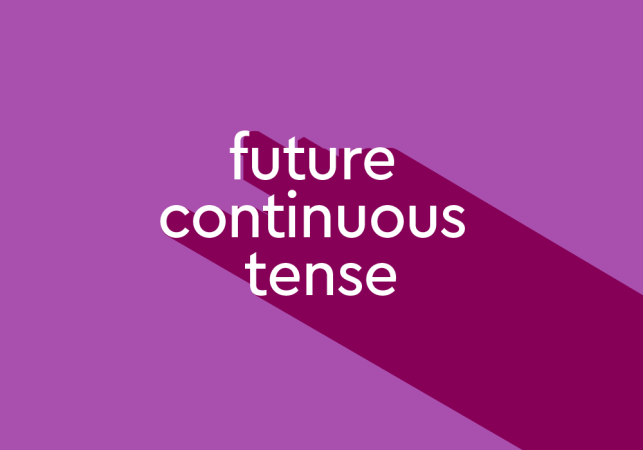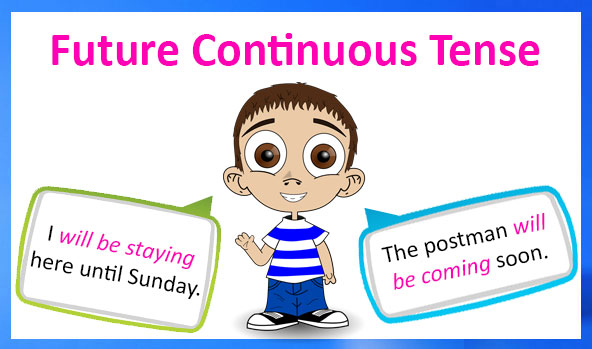آینده استمراری در زبان انگلیسی: ساختار
آینده استمراری در زبان انگلیسی (زمان Future continuous) از دو عنصر تشکیل شده است:
Subject + will be + v+ing

آینده استمراری در زبان انگلیسی (زمان Future continuous): مثبت، سوال، منفی
در جدول زیر ساختار های مختلف آینده استمراری در زبان انگلیسی (زمان Future continuous) در حالتهای مختلف آمده است:
| Affirmative
جملات مثبت |
Negative
جملات منفی |
Interrogative
جملات سوالی |
Negative interrogative
جملات سوالی منفی |
| I will be staying. |
I won’t be staying. |
Will I be staying? |
Won’t I be staying? |
| You will be staying. |
You won’t be staying. |
Will you be staying? |
Won’t you be staying? |
| He will be staying. |
He won’t be staying. |
Will he be staying? |
Won’t he be staying? |
| She will be staying. |
She won’t be staying. |
Will she be staying? |
Won’t she be staying? |
| It will be staying. |
It won’t be staying. |
Will it be staying? |
Won’t it be staying? |
| We will be staying. |
We won’t be staying. |
Will we be staying? |
Won’t we be staying? |
| They will be staying. |
They won’t be staying. |
Will they be staying? |
Won’t they be staying? |
آینده استمراری در زبان انگلیسی (زمان Future continuous): کاربردها

آینده استمراری در زبان انگلیسی به یک عمل یا رویداد ناتمام اشاره دارد که در زمانی دیرتر از اکنون در حال انجام است – کاری در یک زمان مشخص در آینده در حال انجام شدن خواهد بود. آینده استمراری در زبان انگلیسی برای مقاصد متفاوتي استفاده ميشود که در زیر به آنها اشاره کردهایم:
-
آینده استمراری در زبان انگلیسی میتواند برای فرافکنی خودمان به آینده استفاده شود.
مثالها:
- This time next week I will be sun-bathing in Bali.
- By Christmas I will be skiing like a pro.
- Just think, next Monday you will be working in your new job.
-
زمان future continuous میتواند برای پیش بینی یا حدس زدن رویدادهای آینده استفاده شود.
مثالها:
- He’ll be coming to the meeting, I expect.
- I guess you’ll be feeling thirsty after working in the sun.
- You’ll be missing the sunshine once you’re back in England.
-
در شکل پرسشی، زمان future continuous میتواند برای درخواست مودبانه اطلاعاتی در مورد آینده استفاده شود.
مثالها:
- Will you be bringing your friend to the pub tonight?
- Will Jim be coming with us?
- Will she be going to the party tonight?
- Will I be sleeping in this room?
-
زمان future continuous میتواند برای اشاره به رویدادهای پیوستهای که انتظار داریم در آینده اتفاق بیفتد استفاده شود.
مثالها:
- I’ll be seeing Jim at the conference next week.
- When he is in Australia he will be staying with friends.
- I’ll be eating with Jane this evening so I can tell her.
-
زمانی که با still ترکیب شود، زمان future continuous به رویدادهایی اشاره دارد که در حال حاضر اتفاق میافتند و انتظار داریم تا مدتی در آینده ادامه پیدا کنند.
مثالها:
- In an hour I’ll still be ironing my clothes.
- Tomorrow he’ll still be suffering from his cold.
- Next year will she still be wearing a size six?
- Won’t stock prices still be falling in the morning?
- Unfortunately, sea levels will still be rising in 20 years.
مثالهای کاربردی برای آینده استمراری در زبان انگلیسی:
جملات مثبت زمان future continuous:
- I will be writing the letter tomorrow.
- The baby will be playing the whole night.
- I will be helping my mother to make breakfast.
- Sheldon will be eating the cake later.
- Penny will be running the marathon tomorrow.
- She will be taking her dog for a walk.
- Ritz will be coming to our place soon.
- Who will be waiting for John at the railway station?
- I will be arriving at the station by 5:00 P.M.
- My friends will be coming over for lunch tomorrow.
- I will be watering the plants tomorrow morning.
- Shyam will be visiting his aunt tomorrow.
- I will be joining the new office from next week.
- My parents will be flying to Delhi tomorrow.
- Rajesh will be staying at the hotel on Friday.
جملات منفی زمان future continuous:
- I will not be going to bed late tonight. / I won’t be going to bed late.
- You won’t be doing much cooking this week.
- My mother won’t be working tomorrow.
- The children will not be walking to school when it’s snowing.
- My girlfriend won’t be reading my emails anymore.
- They will not be telling us much about next week’s test.
- She won’t be planning any trips until after graduation.
- They won’t be opening the library until 2:00 pm today.
- I won’t be watching the series this month.
- I will not be working tomorrow.
جملات سوالی زمان future continuous:
- Will I be reading any novels written by women this semester?
- Will he be speaking with his advisor this afternoon?
- Will the pilot be announcing updates during the flight?
- Will we be sleeping in cabins or tents on the camping trip?
- Will we be skiing in the mornings and the afternoons?
- Will I be sleeping here?
- Will you be doing laundry tonight?
- Will they be going home today or tomorrow?
جملات سوالی زمان future continuous: با کلمات پرسشی
- Where will he be staying when he is in Panama?
- Where will they be playing their next match?
- When will the presenters be making their presentations?
- Why will the trains be running later on Thursday?
- What will your friends be wearing to the dance?
- I wonder what songs Madonna will be singing at the concert?
- Where will you be working after graduation?
- How long will your parents be traveling in Europe this summer?
ما تیم انگلیش توربو هستیم؛ مجموعهای از تولیدکنندگان محتوا و مدرسان زبان انگلیسی که بهصورت تخصصی روی طراحی دورههای آموزشی و تولید محتوای کاربردی کار میکنیم. هدف ما این است که آموزش زبان را سادهتر، شفافتر و متناسب با نیاز واقعی زبانآموزان ارائه دهیم. دورههای ما متناسب با هر سطح، سن و سلیقهای طراحی شدهاند؛ همچنین آموزشهای رایگان ما با تدریس مدرسین باتجربه در پلتفرمهای مختلف در دسترس شماست.


